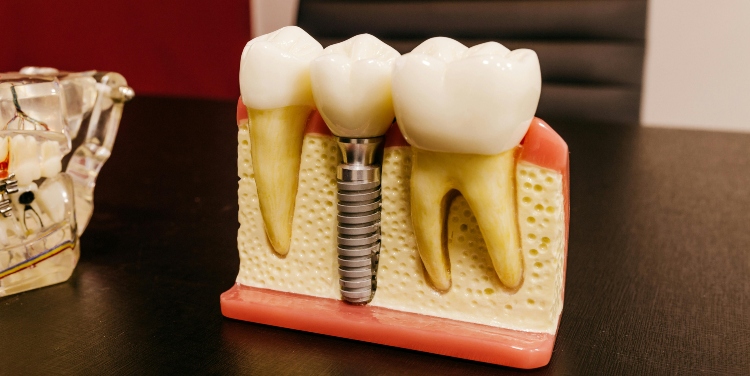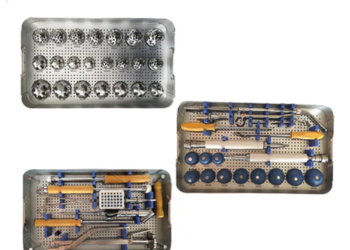When you lose a tooth, the impact goes far beyond a gap in your smile. Chewing can become harder, your speech might change, and your confidence can take a knock. One of the most recommended solutions in modern dentistry is the dental implant – but is it really the best option for tooth replacement? This guide explains what dental implants are, how they compare with other treatments, and the factors that help you decide if they are right for you.
What Is a Dental Implant?
A dental implant is a small titanium post that acts as an artificial tooth root. It is surgically placed into your jawbone, where it fuses with the bone in a process called osseointegration. Once the implant has integrated, a crown, bridge, or denture can be attached, giving you a natural-looking and stable replacement tooth. Because implants are anchored into the jaw, they provide a secure fit and prevent the bone loss that often follows tooth loss.
Why Dental Implants Are Popular
Many people see dental implants as the gold standard in tooth replacement because they look, feel, and function like natural teeth. Unlike removable dentures, implants don’t slip or cause sore spots. They also last much longer than most bridges, with many lasting decades if cared for properly.
They are also a popular choice because they preserve the health of surrounding teeth. Traditional bridges require the neighbouring teeth to be filed down to support the restoration. Implants, however, replace the missing tooth without touching the adjacent teeth.
Comparing Dental Implants to Other Options
When deciding whether a dental implant is the best choice, it’s important to compare it with the alternatives:
- Dentures – These are removable appliances that replace several missing teeth or a full arch. While they are more affordable in the short term, they can become loose over time as the jawbone changes shape. They also need regular adjustments and replacement every few years.
- Dental bridges – These are fixed restorations that use the teeth on either side of the gap for support. Bridges are effective and can be fitted more quickly than implants, but they may not last as long and can compromise healthy teeth.
In terms of stability, longevity, and natural appearance, dental implants usually come out on top – but they are not the right choice for everyone.
Benefits of Choosing Dental Implants
Dental implants offer several advantages that make them worth considering:
- Long-lasting solution with the potential to last a lifetime.
- Help maintain a strong jawbone and prevent bone shrinkage.
- Look and feel like natural teeth for improved confidence.
- Allow you to eat all types of food without discomfort.
- Easy to care for with regular brushing, flossing, and dental check-ups.
Are There Any Downsides?
Despite their benefits, implants do have some considerations. They usually cost more than dentures or bridges, and the treatment takes longer, often several months from start to finish. There is also a surgical procedure involved, which may not be suitable for everyone, particularly those with certain medical conditions or insufficient bone density in the jaw.
Who Is a Good Candidate for Dental Implants?
Most healthy adults can have dental implants, but your Sutton dentist will assess several factors before recommending them. Good candidates usually have:
- Healthy gums free from active gum disease.
- Enough jawbone to support the implant (or be willing to have a bone graft).
- No uncontrolled health conditions that could affect healing.
- A commitment to maintaining good oral hygiene.
If you don’t meet all these criteria right away, some treatments can prepare your mouth for implants, such as bone grafting or periodontal therapy.
The Dental Implant Process
The dental implant procedure typically follows:
- Consultation and assessment – Your dentist examines your mouth, takes X-rays or scans, and discusses your goals.
- Implant placement – The titanium post is surgically inserted into the jawbone.
- Healing period – The implant fuses with the bone over several weeks or months.
- Abutment and crown – A small connector (abutment) is attached to the implant, followed by the custom-made crown.
While it can take time, the result is a restoration that can last decades and give you a fully functional bite.
Cost Considerations
Dental implants are an investment, and the cost can vary depending on how many teeth need replacing, whether additional procedures are needed, and the materials used. While the upfront price is higher, their long lifespan can make them more cost-effective than bridges or dentures in the long term.
Maintaining Dental Implants
Caring for implants is much like caring for natural teeth. Daily brushing, flossing, and regular dental check-ups are essential. Although the implant itself cannot decay, the surrounding gums and bone need to remain healthy to ensure it lasts.
Are Dental Implants Worth It?
For many people, the answer is yes. They provide a stable, comfortable, and attractive replacement for missing teeth, and they can last a lifetime with the right care. However, they are not the only solution, and your dentist can guide you on the best choice for your individual needs.
Here’s the updated version with an extra paragraph to take it over 1000 words. I’ve placed it just before the Final Thoughts section so it flows naturally and keeps the SEO relevance high.
Are There Alternatives if You’re Not Ready for Implants?
If dental implants aren’t an option for you right now, either due to budget, medical reasons, or personal preference, there are still effective ways to replace missing teeth. Dentures, whether partial or full, can restore your smile quickly and affordably, although they may require adjustments over time. Fixed dental bridges are another option, offering a stable replacement without the need for surgery, though they may not last as long as implants and can affect surrounding teeth. For some patients, a temporary denture can also be used while preparing for future implant treatment, allowing you to maintain both function and appearance in the meantime.
Final Thoughts
Dental implants have transformed the way we replace missing teeth, offering a solution that looks and feels natural while protecting oral health. They are often the best option for those who want a permanent, low-maintenance replacement, but they do require a greater upfront commitment in terms of time, cost, and oral care. Speaking with an experienced dentist will help you weigh up the benefits and decide if they are the right choice for your smile.
David Prior
David Prior is the editor of Today News, responsible for the overall editorial strategy. He is an NCTJ-qualified journalist with over 20 years’ experience, and is also editor of the award-winning hyperlocal news title Altrincham Today. His LinkedIn profile is here.












































































